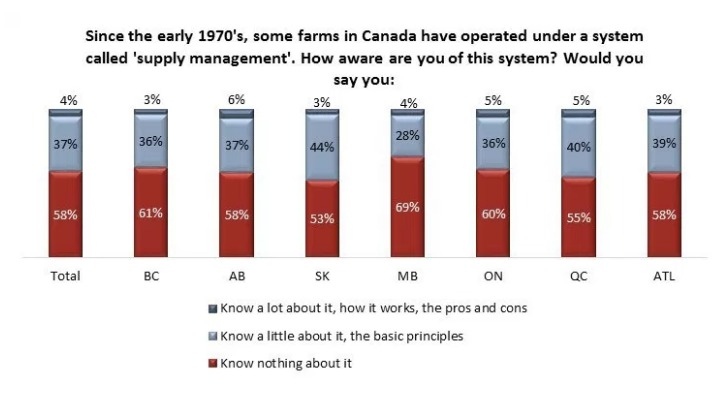Aug 2, 2017
Canadians willing to leverage supply management in NAFTA talks: Poll
, BNN Bloomberg

A majority of Canadians are open to using the country’s existing supply management framework as a NAFTA bargaining chip, even though more than half admit to knowing nothing about it.
According to a poll released Wednesday by the Angus Reid Institute, just over a quarter (26 per cent) of respondents said they’d be in favour of scrapping the current supply management system in the coming NAFTA renegotiations, while 45 per cent would consider putting it on the table ‘only as a last resort.’
“What comes through is two mindsets,” Angus Reid Institute Executive Director Shachi Kurl told BNN.ca. “Canadians as consumers, who would – for the most part - prefer to pay less for supply-managed goods, and then Canadians as citizens, who – from a policy perspective –are concerned about farmers, want to see them protected and want to see their livelihoods not endangered.”
However, 58 per cent of respondents admitted to knowing nothing about supply management, while only four per cent admitted they know a lot about how the system works and its pros and cons.
Canada’s supply management system has been in place since 1971 and is designed to control the price consumers pay for eggs, milk, cheese, chicken and turkey. The policy is a blend of set pricing, supply control and limited competition from foreign producers.
However, about two-thirds of Angus Reid Institute respondents favoured lower prices over supply management. Two-thirds of respondents said they’d rather pay less for milk and cheese without a supply management system, while 70 per cent favoured cheaper prices for eggs or chicken breasts over the current system.

Support for supply management was divided provincially, per Angus Reid’s data. Opposition was above 40 per cent in Alberta and Saskatchewan, while Atlantic Canada showed 44 per cent support.
Kurl noted there was more than geography dividing Canadians on the issue.
“Those regional divides also align to an extent with political divides,” Kurl told BNN.ca. “But you also see some divisions depending on how old people are. Millennials are much more inclined, at this stage in their life, to say: ‘You know what? I would still pay more for supply-managed goods’. It’s more important (to them) than it is for older Canadians in terms of what they’re expressing.”